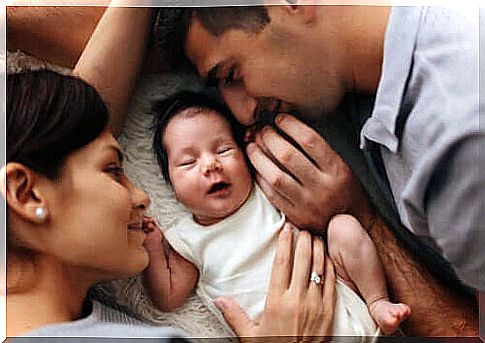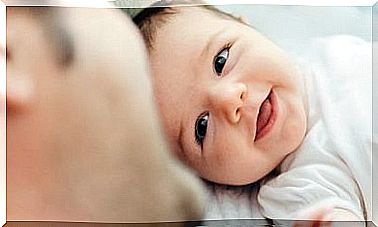Children’s Sleep: How Does It Evolve Over Time?

Babies’ sleep changes as they grow up. Not getting the right amount of sleep can impact your child’s physical and mental health, as well as impact the rest of the family.
Anyone who is a parent surely remembers the sleepless nights spent feeding the baby. Anyone would have liked to sleep at least seven hours straight, but the way babies and children sleep is different from that of their parents (and changes as they grow up).
Why is children’s sleep different from that of adults? How many hours should babies and children sleep? In this article we will try to answer these questions.
Babies’ sleep changes as they grow up
Children’s sleep evolves and changes with age. Babies 0-4 months have to learn to sleep, therefore, a 3-month-old won’t be able to sleep like a 7-year-old. At every age you have different needs, consequently the hours of sleep cannot be the same for everyone.
Circadian rhythms have the job of controlling sleep. They regulate the amount of the hormone that relaxes us (melatonin) and the stress hormone (cortisol) we secrete. These rhythms are regulated by the alternation between day and night and, among other things, are fundamental for cell regeneration and brain activity.

In babies younger than 4 months, circadian rhythms don’t work well because babies still can’t tell when it’s day and when it’s night. Therefore, they have no sleep patterns that can help them sleep; models they will develop later.
How is the sleep of babies during their first months of life?
Babies aged 0-4 months fall asleep and wake up according to their needs. For example, if they are hungry, thirsty or for other reasons. Therefore, their sleep cycles usually last around 40 to 50 minutes.
After 4 months, sleep begins to follow circadian rhythms and is structured through five phases: the REM phase and the four Non REM phases. Sleep cycles can last from 90 to 120 minutes.
It is at this stage where we need to establish the sleep patterns that we want our children to follow when they sleep. From this point on, the hours of daily sleep your baby will need will decrease as he grows up.
How many hours should a child sleep based on age?
As with adults, when a child does not sleep the necessary hours he needs, he is more irritable, has difficulty concentrating and his performance, whatever the task he has to perform, will decrease significantly.
So, as parents, we need to know how many hours of sleep babies need in their growing stages. We will try to answer this question by following the directions provided by the American Academy of Pediatrics (AAP).
The sleep of children: infants
Babies need to sleep many hours a day, as they are in full development. This means they can sleep seven or more hours, both day and night.
The sleep of babies between 4 and 12 months
At this age, children need 12-16 hours of sleep a day.
- From 4-5 months, 4 hours of sleep during the day (divided into three naps).
- From 6 months, 3 hours a day (divided into two daily rests).
The sleep of children from 1 to 2 two years
Taking naps into account, children 1 to 2 years old need 11-14 hours of sleep per day. Already at this age, the number of naps is reduced to one per day. Which means they need between 1.5 and 2 hours of sleep during the day.
From 3 to 5 years old
Children between the ages of 3 and 5 need 10-13 hours of sleep, plus a daily nap.
From 6 to 12 years old
At this stage of age, sleep is reduced to 9-12 hours a day (the duration varies in each child).

During adolescence
Teens need 8-10 hours of sleep a day. Although at this age it is more difficult to control the exact time that children sleep, it is important to explain to them the need and importance of sleeping that number of hours to safeguard their physical and mental health.
Tips to improve children’s sleep
In order for babies to rest well, it is important to establish sleep habits. This must be done from four months onwards. It is precisely at this age that sleep begins to regulate itself. Here are some tips to help your children sleep better.
Establish rituals before going to sleep
If you repeat the same routine before going to bed, children will begin to relax and prepare for sleep. An example of a routine would be bathing before dinner, reading a story, and then going to bed.
Establish schedules
Establishing schedules is very important. Children need to get used to going to bed and waking up at the same time. In this way, we will help them sleep the necessary hours according to their age.
Don’t use your tablet, phone, or watch television before going to bed
The light emitted by the screens activates children’s brains and prevents them from relaxing. Hence, one must avoid exposing children to these devices before going to bed. It is preferable to have a chat or read a book.
Make sure there are adequate sleeping conditions in the bedroom
The room must have adequate conditions for sleeping. For example, correct temperature and humidity, be well ventilated, that there is no noise, etc.
As you have seen, children’s sleep changes according to their needs as they grow up. Needs that are not the same in every phase of growth.
Our tips can help you set the right sleep patterns for your children. By now you will already know how important it is for the physical mental health of children to get the hours of sleep they need.









